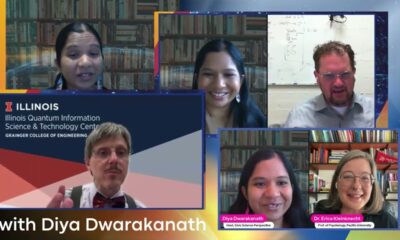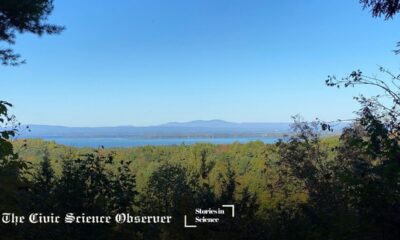Stories in Science Special Series
Crossing the finish line
Divya Shiroor: “By trying to make a mad dash to the finish line we run a very solid risk of not making it at all. In the long run, taking a moment to stop and smell the roses might go a long way.”

Divya Shiroor
[su_boxbox title=”About”]Divya Shiroor is vet grad student at Cornell University. She is a foodie, dancer, bookworm, blogger, dog mom, and twin! The story below was written when she was a 1st year graduate student and published in the NIH BEST Blog. You can follow Divya on Twitter @DivyaShiroor. Cover image by Gerd Altmann from Pixabay. Cover image by Ayesha Coelho from Pixabay. [/su_boxbox]

Divya Shiroor
[dropcap]A[/dropcap] friend of mine once tagged me in the above post on facebook, that was published by a website called the cheekyscientist. I have to admit that I was very flattered. There are many things that are hard about getting a Ph.D., and furthering a particular field by making a meaningful contribution is definitely one of them. But that’s also the most rewarding part of the process. Every Ph.D. is unique and every student’s struggles are different.
When I went through the application process for graduate school and accepted a position at Cornell, I thought my struggles were over and I was set for the next 5 years. Then came the first year and with it came laboratory rotations. I was totally unprepared for the amount of pressure having to find a home to do my Ph.D. from would be.
Now that I’ve found a home, I feel the weight of taking ownership of my project and making something meaningful of it. After a particularly rough week sometime in my first year, I was ranting to my sister on the phone about how my experiments weren’t working out, how my grant looked like something written by a two-year-old, and how I felt like a giant mess. Her wise words to me were “A Ph.D. is not a sprint, it’s a marathon. Stop trying to speed to the finish line” I’m still struggling with the concept of a Ph.D. being a marathon. With whatever experiment I’m working on, I can’t help but feel like it’s bringing me one step closer to making a big breakthrough. Every failed experiment brings with it the frustration of wanting to figure things out as soon as I can, and every successful experiment makes me want to ride the momentum and get as much as I can done.
Most Ph.D. students struggle to find a pace that is sustainable. Grad school is rife with rumors of students carrying sleeping bags to lab, finding a cozy spot to catch a shut eye in the microscope room while working nights and working months on end without a break. It’s no wonder that over 60% of graduate students feel overwhelmed, exhausted and depressed. By making their Ph.D. their whole life, they’re forgetting how to live. An added complication is that life in science can be very isolating. A Ph.D. is not like any other program. You are not part of a big class, you don’t interact with a whole bunch of other students on a regular basis, and in the process it’s very easy to feel like only you are feeling pressure while everyone else is doing fine. Truth be told, much of academia is like this, and as you rise up in the ranks, it only gets worse.
By trying to make a mad dash to the finish line we run a very solid risk of not making it at all. In the long run, taking a moment to stop and smell the roses might go a long way. People handle stress and pressure in different ways. There is no one perfect solution for all, except that you have to make yourself a priority. Just as working long hours takes discipline, leaving lab at a decent time takes discipline too. While it’s tempting to stay until midnight collecting data all week, in the long run, that’s a recipe for a quick burnout. Getting out of lab a decent time and doing something for yourself, whether its hitting the gym, cooking a decent meal or spending some quiet time reading adds that much needed balance.
Another thing to watch out for is turning into a reclusive lab rat, the kind that has interactions solely with the actual lab rats. Getting out of the lab and mingling with others really helps put things into perspective. It keeps you from sinking into loneliness and isolation and helps you realize that feeling pressure is completely normal and a part and parcel of grad school. I feel extremely fortunate to be part of a school like Cornell. The first thing that struck me when I came to interview here was the strong sense of community. The program I am in makes an involved effort to maintain a sense of kinship by organizing numerous socials and other events. They make for great opportunities to interact with other grad students. Another extremely important benefit? – free food! Lastly, it’s important to remember to not let the quest to reach the finish line deprive you of your journey. As the wise quotation goes, “It is good to have an end to journey toward, but it is the journey that matters in the end.”
Metrics
Sessions
Total number of Sessions. A session is the period time a user is actively engaged with the page.
Visitors
Users that have had at least one session within the selected date range. Includes both new and returning users.
Page views
Pageviews is the total number of time the article was viewed. Repeated views are counted.
The CS Media Lab is a Boston-anchored civic science news collective with local, national and global coverage on TV, digital print, and radio through CivicSciTV, CivicSciTimes, and CivicSciRadio. Programs include Questions of the Day, Changemakers, QuickTake, Consider This Next, Stories in Science, Sai Resident Collective and more.

-
Audio Studio1 month ago
“Reading it opened up a whole new world.” Kim Steele on building her company ‘Documentaries Don’t Work’
-
 Civic Science Observer1 week ago
Civic Science Observer1 week ago‘Science policy’ Google searches spiked in 2025. What does that mean?
-
Civic Science Observer1 month ago
Our developing civic science photojournalism experiment: Photos from 2025
-
Civic Science Observer1 month ago
Together again: Day 1 of the 2025 ASTC conference in black and white
Contact
Menu
Designed with WordPress
























